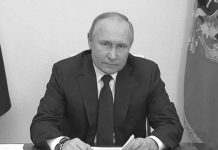Putin has embarked on a costly endeavor by invading Ukraine. He had proclaimed Ukraine a Lenin’s state but met there soldiers singing patriotic songs older than the Soviet regime. In the last two weeks, Russia had lost 12,000 soldiers on Ukrainian soil, but could not claim a single big city in Ukraine. Had the empire of lies stumbled over Ukrainian resistance?
Article is provided by representatives of Kyiv-Mohyla University who have made their services available to provide accurate, timely, on-the-ground reporting about the war in Ukraine, including nuanced localized ongoing updates on what is happening across the country, as well as commentary and analysis.
When it all started
Moscow held control over Kyiv for more than three centuries. When the Russian empire ceased to exist in October 1917, it took the Soviet army a mere few weeks to shift the attention from Russia to the newly established Ukrainian state. In 1918, the Bolsheviks captured Kyiv. The same year, they proclaimed Donetsk-Kryvyi Rih Soviet Republic. Next year it made Kharkiv the capital of the Ukrainian Soviet Republic.
Putin seems to be following in the footsteps of his imperial and Soviet predecessors. With history repeating itself today, is there anything Moscow’s tactics might be missing this time?
War against history
To say that Ukraine is Lenin’s creation is to save yourself precious time studying Ukraine’s history since at least 9th century Kyivan Rus’. Considering the complexity of statehood as a form of social organization, one can only assume how old is Kyiv itself.
What we know for sure is that Kyiv has for a long time been a center of religion, trade, art, and politics. This is exactly what makes it so desired, yet so inconvenient to Moscow, which is trying to establish its supremacy in Eastern Europe.
Russia has a long history of underestimating the Ukrainian people. Many Ukrainians, as well as Russians, are Orthodox Christians. However, just as not all Catholic people have the same history, Ukraine and Russia do not have the same past. Ukraine’s past involves statehood, constitution, national resistance, opposition to Moscow in politics, literature, art, and social movements. It could not have been possible without a sense of national belonging, which rests on a single language and shared values.
Not knowing it is one thing, denying it is completely different. Putin seems to do the latter. Can he expect to succeed while denying Ukraine’s past?
Modern trauma
Annexing Crimea and occupying Donbas have played their part in justifying the Russian full-scale war against Ukraine. Putin attained an image of an architect of the new Russia, which included the acquisition of new lands. Also, Crimea and LDNR projects have made him believe that he could achieve his geopolitical goals by military might and political scam. The annexation of Crimea was welcomed by the majority of the Russian population. However, for the Ukrainian people, it did more damage than good.
Ukraine is a sovereign state with a distinct culture, which had been crafted for centuries by the Ukrainians themselves. To challenge it means to spend the resource on creating a propaganda machine and back it up with action (like the false referendum in Crimea and financing of the puppet republic in Donbas). As in 1918, a lot is at stake right now for Russia. However, today Ukraine is an independent democratic state, which has been welcomed by international society in traditional (recognition by all other states) and specific ways (regional cooperation). By the time of the 2022 Russian invasion, Ukraine has been in association agreement with the EU and working towards NATO membership.
Putin continues to question every Ukrainian choice, which only distances it from Russia. When Ukraine ousted president Yanukovych who refused to sign the Ukraine-EU Association agreement, Russian troops crossed the Ukrainian border. Russian media was calling the Ukrainian government Nazi and illegal. Few weeks before invading, Kremlin demanded from the Alliance to never welcome Ukraine.
For Putin, it was clear that the security landscape in Eastern Europe was changing. For Ukraine, it was obvious that Russian appetite for Ukraine would not disapper with Crimea annexed and parts of Donetsk and Luhansk regions occupied.
In the last eight years, thousands of Ukrainians were killed in Donbas as a result of war. Today, Putin wants to “de-Nazify” Ukraine by removing president Zelenskyy whom Ukrainians have elected, and appointing the occupation administration he has formed instead. He wants to “de-militarize: Ukraine by neutralizing soldiers who defend their homes and families from Russian wreckage machinery. One may only try to find the logic behind these actions.
Another important factor in Putin’s costly war in Ukraine is the Russian-speaking population of Ukraine. He is right to assume that Ukraine had undergone drastic changes under Soviet rule. What he misses is the direction of those changes. In the 30s of the XX century, Ukrainians have faced Holodomor, or genocide by famine, and unprecedented political persecution. Not only did these events alter the Ukrainian demographics for decades to come, but they have also left a scar on the Ukrainian people. Older Ukrainians — now great grandmothers and great grandfathers — still remember the horrors of that age. For them, the shelling of Ukrainian homes by the Russians and the killing of civilians feels scarily familiar.
What’s up with Kremlin?
Kremlin gave an order to conquer Ukraine in two days. The article about Russia’s victory was automatically posted by Russian media on February 26th. From the beginning of the invasion, it was obvious that to take Ukraine, Putin must have either a fantastic army or an ordinary army fighting an ordinary army. However, the Ukrainian army is not ordinary. It receives equipment from countries like the USA, the UK, Poland, and Lithuania. It is being funded by the Ukrainians through both taxes and personal donations.
This is another historical misconception Putin had made. By invading Ukraine in 2014, he convinced Ukrainians of the importance of defense. Similarly, in 2022, Germany has doubled its defense spending and Nordic states have reviewed their relations with NATO.
Viewing Ukraine as a second Belarus was wrong from the very beginning. Russia never had to invade Belarus. Ukraine, on the other hand, had always been a difficult target. Not only does Ukraine have a history of national armed resistance, but also a record of political life stretching out from Kyiv Rus to today’s independent Ukrainian state. This experience is not for Putin to doubt or deny.
For Ukraine to become a Russian client state, Putin has to destroy all political alternatives to Kremlin in Kyiv. This is exactly what he aims to do, but killing a president in Ukraine is not the same thing as in Russia or Belarus. Ukrainian people have elected Zelenskyy. As in any democratic state, in Ukraine, people are the reason why a president is in charge of the country. If he ever loses his position, there will still be a place for others to step in. A president does not determine the political climate in Ukraine. It is the political climate that determines a president. It has been the case with either Ukrainian presidents or hetmans or kings. There’s no way to be aware of this without knowing the history of Ukraine.
The world against you
The Russian 2014 invasion of Donbas did not produce the desired effect for Russia. He faced criticism abroad and the Russian economy was damaged by the Western sanctions. In addition, Ukraine continued to build tighter relations with the EU and NATO. Putin did not want NATO troops at his borders with Ukraine, which he viewed central to Russian empirical interests.
Putin was right to assume that NATO will not fight in Ukraine in case of the Russian invasion, but he was wrong about everything else. He still maintains a high level of support at home, but the international condemnation of his actions in Ukraine could not have been bigger. Solidarity with Ukraine is shown in historical terms. For example, the Government of Guernsey donated £500,000 to support the people of Ukraine. This became one of the largest single monetary commitments in recent history.
For Putin to find military or evident political support, he must have more than a group of “yes-men” and a domestic propaganda machine. There’s no evidence of Putin’s cause in Ukraine being unquestionably shared by his economic partners. States like China, Kazakhstan and Cuba abstained during a UN vote to condemn Russia’s invasion of Ukraine.
Moreover, the growing intensity of international sanctions has opened the pandora box of Russian domestic policy, adding it to the list of things for Putin to maintain. Will Putin be able to repeat the success of Crimea in Russia this time with the whole of Ukraine?
80% of Russians supported the annexation of Crimea. Today, 71% of Russians support the war against Ukraine. This number may change the moment Russian people discover how many of their men died in Ukraine as a result of war. People already come to the streets in Russia to protest against the war in Ukraine.
A “special military operation” in Ukraine had to be an easy win for Putin’s regime. Instead, it became a full-scale military confrontation in a country where the president refused to flee and weapons are given out to ordinary people at their request to defend their communities. If Putin wants to have Ukraine, he will need to sacrifice more than he’d expected. No matter, will it be more dead soldiers, more wasted weapons, or a nuclear disaster, — in any event, the Russians will be directly affected by what is currently going on in Ukraine. If there’s a chance of Putin’s regime to survive, the cost for the Russians and for Putin himself will be too high.




